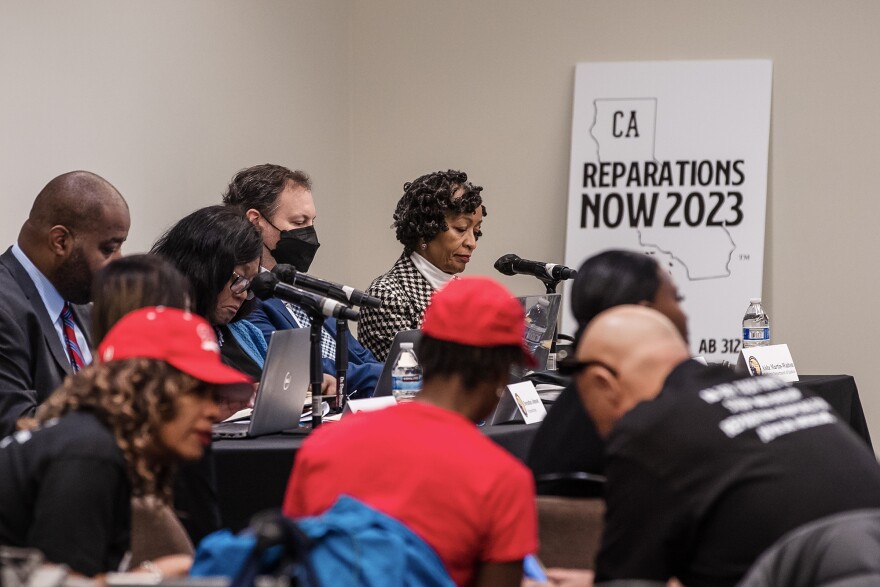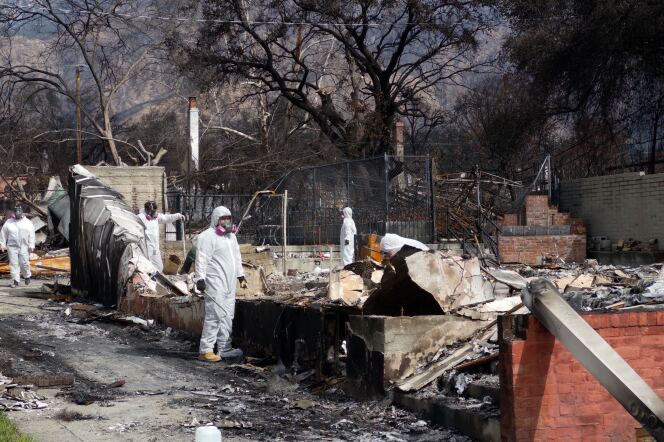This story is free to read because readers choose to support LAist. If you find value in independent local reporting, make a donation to power our newsroom today.
LA Reparations Commission Will Host Its First In-Person Event

After two virtual public meetings, the Los Angeles Reparations Advisory Commission is hosting its first in-person meeting at the California African American Museum on Saturday.
The meeting will include a timeline for the program, Q&A, feedback, and academic research necessary for understanding the extent of systemic harms inflicted upon Black communities throughout the city.
Before the U.S. Civil War, California was technically a free state, but the state legislature supported the Federal Fugitive Slave Act. Capri Maddox, executive director of the Los Angeles Civil + Human Rights and Equity Department (LA Civil Rights), says slaves who escaped were sent back to the Antebellum South to return to their masters. (Maddox is also a board member of Southern California Public Radio.)
Even after slavery, the city continued to punish Black Angelenos through land seizures, redlining, restrictive housing covenants and more, Maddox said.
"These areas of Los Angeles that light up with COVID mortality rates were the same areas of the redlining maps of the 1930s," she said. "It still shows pockets of Los Angeles that are suffering to this day."
While California has a task force examining reparations at the state level, Maddox emphasizes that the L.A. Reparations Advisory Commission, which began meeting in 2021, focuses on communities within the city.
African Americans are overrepresented in the unhoused community and underrepresented in generational wealth, according to Reparations Advisory Commission Chair Michael Lawson.
"We wanted to be intentional to say 'Los Angeles sees you,'" Maddox said. "This is a chapter that must be addressed to move forward and to be who we're telling the world who we are, especially with saying 'Los Angeles is for everyone.'"
Right now, the commission is in the community outreach phase and has received 768 responses to ways in which the city might provide reparations for Black Angelenos. Maddox says there have been suggestions of credit toward first-time home buyer programs, free or reduced college education, programs for housing, youth employment and more.
The next phase will start in July with a comprehensive academic study. The third phase will include official reparations solutions from the community in April 2024. Maddox says a final proposal could be sent to the city council and the mayor as soon as early 2025 to "see where the city can lift this community that's been wronged for so long."
"We want to make sure that we have a Los Angeles where everyone can thrive and we cannot ignore our history, not for the African American population or any population in the city of Los Angeles," she said.
-
As the clerk-recorder of Orange County, Hugh Nguyen has many duties — including coming up with new ways to make it easy for folks to put a ring on it.
-
The house was listed for $450,000. Its listing agent expects escrow to close early next week.
-
The Trump administration says it has already arrested thousands of immigrants in the U.S. without legal status, many without criminal records.
-
Reopening of the Palisades was scheduled for 8 a.m. Sunday. But on Saturday night, L.A. Mayor Karen Bass said checkpoints will remain in place, after she secured additional law enforcement resources from Gov. Gavin Newsom.
-
Museums in New York and Chicago want to hear what worked and what didn’t at the Getty Villa.
-
Some California State Universities are reminding staff of policies in place to refer any questions from immigration agents to campus police.












